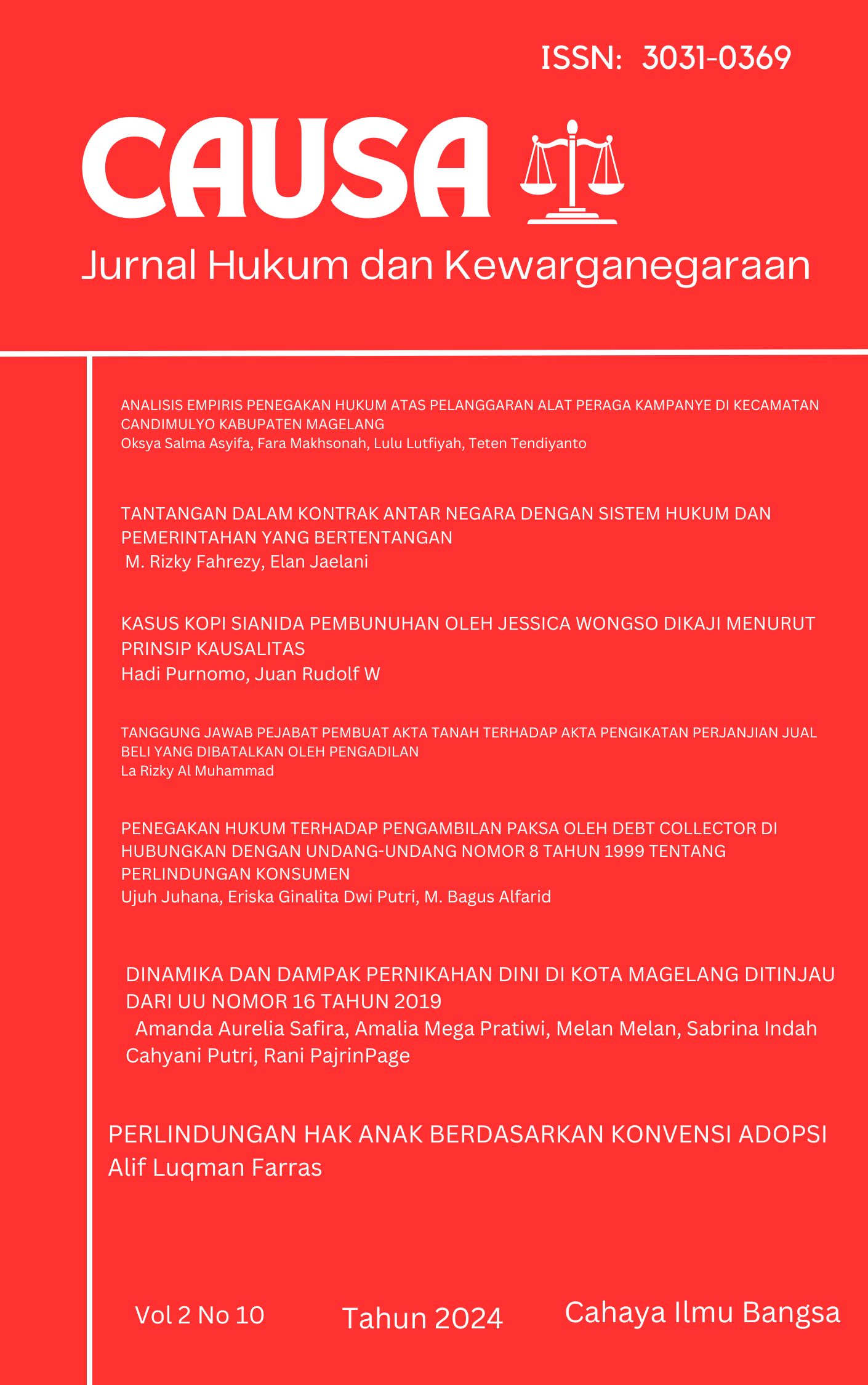TINDAK PIDANA PENCUCIAN UANG DALAM PERSPEKTIF HUKUM POSITIF DAN ISLAM: ANALISIS TEORETIS DAN STUDI KASUS DI INDONESIA
- Authors
-
-
Aditya Gilang Rifai
Manajemen, Fakultas Ekonomi, UIN Maulana Malik Ibrahim MalangAuthor -
Romi Faslah
Manajemen, Fakultas Ekonomi, UIN Maulana Malik Ibrahim MalangAuthor
-
- Keywords:
- Money Laundering, Anti-Money Laundering Law, Islamic Law, PPATK, Sharia Financial System
- Abstract
-
Money laundering is a transnational crime that poses a significant threat to economic stability, the integrity of financial systems, and the rule of law in a country. This study aims to analyze the effectiveness of Indonesia’s positive legal framework in combating money laundering, examine relevant case studies, and explore the Islamic legal perspective on such practices. Using a normative juridical and qualitative-descriptive approach, this research analyzes Law No. 8 of 2010 along with scholarly literature and Islamic fatwas. The findings indicate that despite the establishment of regulations and institutions like the Financial Transaction Reports and Analysis Center (PPATK), law enforcement faces technical, technological, and inter-agency coordination challenges. Meanwhile, Islamic law, based on the principles of maqashid sharia, emphasizes justice, transparency, and the prohibition of unlawfully acquired wealth. Integrating positive law and sharia-based frameworks offers an alternative strategy to strengthen anti-money laundering efforts in Indonesia.
- Downloads
- Published
- 2025-06-21
- Section
- Articles
How to Cite
Most read articles by the same author(s)
- Ainul Lutfiyah, Romi Faslah, STANDARISASI HALAL SEBAGAI KEUNGGULAN KOMPETITIF INDUSTRI HALAL GLOBAL , Causa: Jurnal Hukum dan Kewarganegaraan: Vol. 13 No. 7 (2025): Causa: Jurnal Hukum dan Kewarganegaraan
- Dina Angelina, Romi Faslah, TANTANGAN DAN PROSPEK STANDARISASI HALAL INDONESIA DI ERA GLOBALISASI , Causa: Jurnal Hukum dan Kewarganegaraan: Vol. 13 No. 7 (2025): Causa: Jurnal Hukum dan Kewarganegaraan
Similar Articles
- Marsya Putri Salsabila, PENDEKATAN ECONOMIC ANALYSIS OF LAW TERHADAP RUU PERAMPASAN ASET DALAM ASPEK EFEKTIVITAS DAN RASIONALITAS PEMULIHAN ASET HASIL KORUPSI , Causa: Jurnal Hukum dan Kewarganegaraan: Vol. 12 No. 12 (2025): Causa: Jurnal Hukum dan Kewarganegaraan
- Nazwa Defa, Baidhowi Baidhowi, Analisis Hukum Syariah Terhadap Mekanisme Pembiayaan Mudharabah dalam Lembaga Keuangan Syariah , Causa: Jurnal Hukum dan Kewarganegaraan: Vol. 15 No. 4 (2025): Causa: Jurnal Hukum dan Kewarganegaraan
- Rajwa Mutiara Fauziyyah Farni, Tanti Handayani, Verga Aziz, Nugroho Adie Prasetyo, Muhammad Yandi Ramadiansyah, RELEVANSI HUKUM ISLAM DALAM KONTEKS HUKUM POSITIF DI INDONESIA , Causa: Jurnal Hukum dan Kewarganegaraan: Vol. 15 No. 1 (2025): Causa: Jurnal Hukum dan Kewarganegaraan
- Haidar Muhamad Ali, WASIAT WAJIBAH DALAM HUKUM KEWARISAN ISLAM: ANALISIS PUTUSAN PA SURABAYA NOMOR 2331/PDT.P/2024/PA.SBY , Causa: Jurnal Hukum dan Kewarganegaraan: Vol. 14 No. 4 (2025): Causa: Jurnal Hukum dan Kewarganegaraan
- Ghalih Dwi Wibowo, Inggit Kusumaningrum Aulia Sukamto, Erika Silvi Setiawati, Adilah Dian Isnaeni, Khansa Adelia Labibah, STRATEGI PEGADAIAN DALAM MENGELOLA RISIKO GADAI EMAS STUDI KASUS KOMPARASI ANTARA PEGADAIAN SYARIAH DAN KONVENSIONAL , Causa: Jurnal Hukum dan Kewarganegaraan: Vol. 15 No. 1 (2025): Causa: Jurnal Hukum dan Kewarganegaraan
- Muhamad Soli , Habibi Al Amin , POTENSI KONFLIK DALAM TRADISI PERKAWINAN ETNIS MADURA PERSPEKTIF MASLAHAH MURSALAH (Studi Kasus Uang Asap Pada Keluarga Madura Desa Sutera Kecamatan Sukadana Kabupaten Kayong Utara) , Causa: Jurnal Hukum dan Kewarganegaraan: Vol. 14 No. 5 (2025): Causa: Jurnal Hukum dan Kewarganegaraan
- Muhammad Yasin, Masrokhin Masrokhin, DENDA ADAT SETELAH PERCERAIAN PADA MASYARAKAT LAMPUNG PEPADUN (STUDI KASUS DI DESA KAGUNGAN RATU KECAMATAN TULANG BAWANG UDIK KABUPATEN TULANG BAWANG BARAT) , Causa: Jurnal Hukum dan Kewarganegaraan: Vol. 14 No. 8 (2025): Causa: Jurnal Hukum dan Kewarganegaraan
- Githa Asmadeningrum Rosady, Baidhowi Baidhowi, KAJIAN HUKUM EKONOMI SYARIAH TERHADAP PRAKTIK PERDAGANGAN BERJANGKA DENGAN PENEKANAN PADA UNSUR GHARAR DAN MAYSIR DALAM PERDAGANGAN MODERN , Causa: Jurnal Hukum dan Kewarganegaraan: Vol. 13 No. 10 (2025): Causa: Jurnal Hukum dan Kewarganegaraan
- Junaedi Hasyim, Suhufi, Misbahuddin, KONFLIK DAN KETEGANGAN DALAM HUKUM ISLAM: ANTARA IDEALISME DAN REALISASI , Causa: Jurnal Hukum dan Kewarganegaraan: Vol. 15 No. 3 (2025): Causa: Jurnal Hukum dan Kewarganegaraan
- Junaedi Hasyim, Rahmatiah, Andi Muhammad Akmal, HUKUM ISLAM DALAM BIDANG EKONOMI (IQTISHADIYYAH) DI INDONESIA , Causa: Jurnal Hukum dan Kewarganegaraan: Vol. 15 No. 3 (2025): Causa: Jurnal Hukum dan Kewarganegaraan
You may also start an advanced similarity search for this article.

